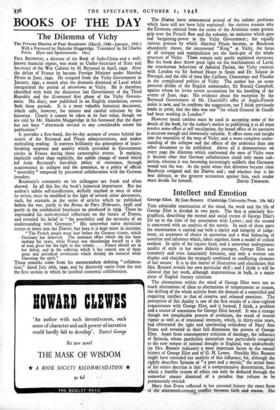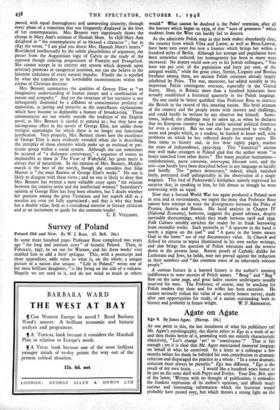Intellect and Emotion
George Eliot. By Joan Bennett. (Cambridge University Press. 10s. 6d.) THIS admirable examination of the mind, the work and the life of George Eliot is divided in two parts. The first is concisely bio- graphical, describing the mental and social events of George Eliot's life up to the time of her association with Lewes ; and the second is concerned with an analysis of the novels. In each of these parts the examination is carried out with a clarity and integrity of judge- ment, an acuteness of choice in quotation and a vlise balancing of assertion and inference which, taken together, form a model of critical method. In spite of the equine head, and a somewhat androgynous quality of style in her more didactic passages, George Eliot was extremely and even luxuriantly feminine, and only a woman can display and elucidate the strangely combined or conflicting elements of her nature. It is in this matter of illustration and elucidation that Mrs. Bennett reveals her own particular skill ; and I think it will be allowed that her work, although unpretentious in bulk, is a major piece of English literary criticism.
The alternations within the mind of George Eliot were not so much alternations of ideas as alternations of temperament or system, the shifting of the whole activity from the domain of a controlled and enquiring intellect to that of creative and released emotions. The perception of this duality is one of the first results of a clear-sighted acquaintance with George Eliot, and it formed, I think, a problem and a source of uneasiness for George Eliot herself. It was a strange though not inexplicable process of evolution, the result of mental vigour as well as of emotional intensity, which, in thirty-nine years, had obliterated the tight and unrelenting orthodoxy of Mary Ann Evans and revealed in their full dimension the powers of George Eliot. Apart from contemporary criticism of theology, the influence of Spinoza, whose pantheistic naturalism was particularly congenial to the new temper of rational thought in England, was undoubtedly (as Mrs. Bennett indicates) a most important factor in the mental history of George Eliot and of G. H. Lewes. Possibly Mrs. Bennett might have extended her analysis of this influence, for, although she rightly describes Spinoza as " a poet and a mystic," the actual basis of his entire doctrine is that of a comprehensive determinism, from which a feasible system of ethics can only be deduced through the somewhat uneasy dismissal of a paradox that refuses to be permanently evicted.
Mary Ann Evans reflected in her personal history the exact form of the nineteenth-century conflict between faith and reason. She passed, with equal thoroughness and unwavering sincerity, through every phase of a transition that was frequently displayed in the lives of her contemporaries. Mrs. Bennett very ingeniously shows the change in Mary Ann's estimate of Hannah More. In 1838 Mary Ann delighted in " the contemplation of so blessed a character " ; but in 1845 she wrote, " I am glad you detest Mrs. Hannah More's letters." Bewildered intellectually by the subtle plausibilities of argument, she passes from the Augustinian logic of Calvin to the study of the opposed though enticing propositions of Puseyite and Evangelical. She cannot accept in its entirety any system which depends upon arbitrary premises or categorical assertion, nor can she believe in the inherent sinfulness of every natural impulse. Finally she is repelled by what she considers to be formidable inconsistencies within the corpus of Christian doctrine.
Mrs. Bennett summarises the qualities of George Eliot as " an imaginative understanding of human nature and a combination of reason and sympathy." And yet the structure of her narrative is not infrequently disjointed by a diffident or conscientious prolixity of exposition, as jarring and intrusive as the superfluous explanations which have become so deplorable a feature of broadcasting. These commentaries are not wholly outside the tradition of the English novel, as Mrs. Bennett is careful to remind us ; but they have an incongruous effect in the novels of George Eliot, not unlike those vestigial appendages for which there is no longer any functional justification. Very properly, Mrs. Bennett shows how the excellence of George Eliot is most evidently revealed when she is describing the interplay of those elements which make up an enclosed or par- ticular group within a social system. Although she can sometimes be accused of "a dishonest contrivance," a sequence of events as implausible as those in The Vicar of Wakefield,- her great merit is always that of naturalism. In the opinion of Mrs. Bennett, Middle- march is the best of the novels, though she considers that Silas Marner is " the most flawless of George Eliot's works." No one is likely to disagree with these views ; and no one is likely to deny that Mrs. Bennett has written a most valuable essay upon " the relation between the creative artist and the intellectual woman." Saintsbury's opinion of George Eliot has long been obsolete, but I doubt whether her position among the great Victorians and her superb skill as a novelist are even yet fully appreciated ; and that is why this book has a double value, both as a considered exercise in literary criticism and as an incitement or guide for the common reader.
C. E. VULLIAMY.



































 Previous page
Previous page